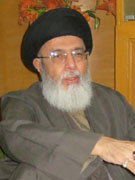|
|
|
|
| Released by Syed Qamar Haider Zaidi; Translated by S M Naqvi | ||
|
May 21, 1985 Junejo - Moosavi agreement is the milestone of struggle for religious independence in Pakistan – Shuja’at Bukhari The mutual understanding and brotherhood displayed by all recognised schools of thought in creation of Pakistan resulted in the creation of first Islamic ideological State; the war for livelihood and aid by a few groups could not be termed sectarianism or groupism – Address of the additional secretary general of the TNFJ to the Shia representatives of the Potohar region at Qasr e Imam Musa Kazim (PBUH) ISLAMABAD, May 22: Syed Shujaat Ali Bokhari, the Additional Secretary General of Tehreek e Nafaz e Fiqh e Jafariya has said that the May 21, 1985 Junejo-Moosavi agreement is the milestone of struggle for religious independence in Pakistan as a result of which the tyrant restrictions on Milad-e-Mustafa (SAAW) and Azadari Syed-us-Shuhada (A.S.) were removed and the efforts of some self-interest in turning Pakistan into a State of particular group were thwarted; the ruling classes who feel proud in polishing the shoes of the coloial powers starts behaving then Pakistan can be free from lots of problems; the war for livelihood and aid by a few groups could not be termed sectarianism or groupism. These views were expressed by him while addressing a representative meeting of Shia elite from Potohar region here at Qasr-e-Imam Musa Kazim (PBUH). Shuja’at Bukhari said the mutual understanding and brotherhood displayed by all recognised schools of thought in creation of Pakistan resulted in the creation of first Islamic ideological State. Unfortunately, he added, the founder of the Pakistan and the father of the nation, Quaid-i-Azam Muhammad Ali Jinnah passed away after one year of creation of Pakistan leaving the motherland in the hand of such politicians and rulers whose wrong policies became the preface of one martial law after the other. The first martial law increases the sense of deprivation while the second resulted in the breakage of the country into two parts, he added. The Zia’s tyranny was imposed when the country was put on the road of progress and development; acting contrary to the basic ideology of Pakistan and the teachings of the Quaid e Azam, Zia announced to turn Pakistan into a state of a particular group; these developments became the cause of setting up Tehreek Nafaz Fiqh-e-Jafariya so as to stop him from turning Pakistan into a sectarian state. He said announcement to turn Pakistan into State of a particular group was an international conspiracy aimed at pitching Pakistan with its neighbouring Islamic states causing harm to the Muslim unity. The TNFJ leader said that Tehreek e Nafaz e Fiqh e Jafaria took over the Pakistan Secretariat for the protection of Pakistan’s ideological basis and during this process, a Tehreek worker Muhammad Hussain Shad kissed martyrdom. The tyrant’s intentions were put on hault for a while but again in 1984, he introduced an amendment in Police Act (3) 30 to play a new game of limiting Milad-un-Nabi and Azadari processions. Heavy shelling and firing was committed on Ashoora procession in which uncountable Azadars were injured and 1,035 people including the Quaid-i-Millat Jafariya Agha Syed Hamid Ali Shah Moosavi were arrested. From that point began the peaceful agitation from the platform of Hussaini Mohaz that continued unabated for eight months. During this movement, 14,000 arrests were courted that included 165 Ahle Sunnat and eight Christians. In the meanwhile, he said, non-party elections were held in the country and Junejo government was formed. Prime Minister Muhammad Khan Junejo struck an historic agreement with Quaid e Millat e Jafariya Agha Syed Hamid Ali Shah Moosavi on May 21, 1985. The first article of this agreement made it clear that the central government in consultation with the provincial governments has decided that Milad-un-Nabi and licensed and traditional religious Azadari processions will continue to be taken out as usual and would not be covered under the Police Act; a committee would be formed to look into Shia’s demand and will make recommendations; the Quaid-i-Millat Jafariya Agha Syed Hamid Ali Shah Moosavi will suspend agitation from the Hussaini Mohaz. As a result, he said, restrictions on Milad-un-Nabi and Azadari processions were lifted; 14,000 people arrested during the agitation were released; a 16-member Shia Demands Committee came into being comprising four federal ministers and four persons each Shia, Brelvi and Deoband schools of thought. Shuja'at Bukhari said that later the Zia’s tyranny tried to introduced private Shariat Bill on which the Quaid-i-Millat Jafariya Agha Syed Hamid Ai Shah Moosavi made it clear that Pakistan’s official religion is Islam, therefore, there is no need of any Shariat Bill and the Shariat is enforced through sincerity of purpose and not through Shariat Bills. He said Ziaul Haq and his remnants continued following his agenda and sowing the seeds of biases and hatred but Tehreek Nafaz Fiqh-e-Jafariya always thwarted such conspiracies. Many restrictions were imposed on Maktab-e-Tasheyo and efforts were even made to impose ban on translations and tafaseer of Quran, and Nehjul Balaghah. The seed of terrorism sown by Ziaul Haq continued to grow therefore the then Chief Justice Sajjad Ali Shah took a suo moto notice. Tehreek Nafaz Fiqh-e-Jafariya presented the 800-page document comprising Moosavi Peace Formula in the Supreme Court which was praised by the judiciary and announced to make it a part of the judicial record directing the government to implement the same. The TNFJ leader said the terrorist organisations were banned during the fourth martial law restricting terrorism to some extent but soon after the transfer of power to the civil representatives, the banned organisations began to work under new names and the terrorism reached to the extent that no part of the country remained safe. Although the colonial powers tried their utmost to increase provincialism, sectarianism, lingualism and racism in the country but the citizens of Pakistan through their unity and brotherhood always proved that there is no such conflict and it is the only war of interests on the part of some groups. Syed Shujaat Ali Bukhari said that today every part of Pakistan is bleeding and in this situation the biggest part played by those rulers and the politicians who feel proud to polish the shoes of the colonial power, if the ruling class start behaving then many problems faced by Pakistan can be rooted out. Shujaat Ali Bukhari made it clear that to take Pakistan to heights of its glories, it is necessary for the rulers to deliver the rights of all schools of thought and for this purpose there is a need to stop the demonition of the people with particular thinking from the religious institutions and it is necessary to inculcate the spirit of the creation of Pakistan in the whole nation, this way no power on earth could stay on front of unity and brotherhood nor it can cause any harm to Pakistan, he added.
|
||
|
(PBUH & HHP): Peace be upon him and on his holy progeny (PBUH): Peace be upon him/her (PBUT): Peace be upon them |
||
|
|
||


